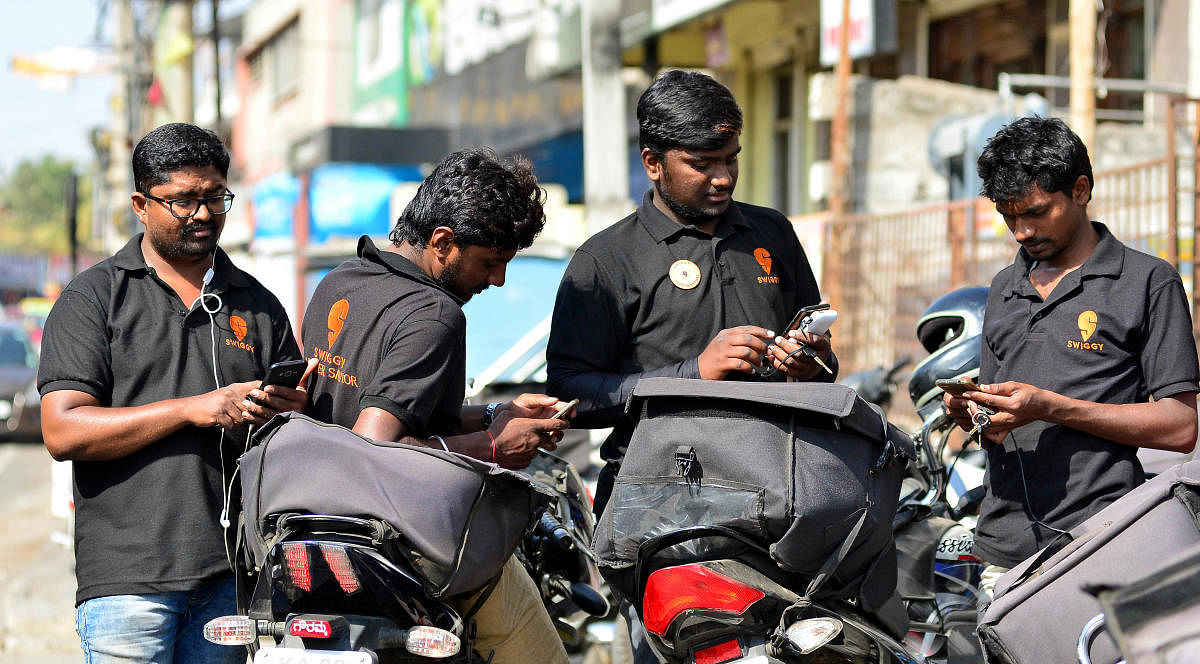
Swiggy online delivery partners.
Credit: DH Photo
The Niti Aayog estimates that the gig workforce in India has reached approximately 7.7 million today, spanning various sectors and offering flexible job opportunities to a diverse workforce. While it has so far been male-dominated, the participation of women has increased from 18 per cent to 36 per cent. The most visible gig workers are those engaged in service delivery and constantly on the move. In Bengaluru, they can be seen riding, rain or shine, early in the morning or late at night. Unfortunately, gig workers are often perceived as informal daily wage labourers, deprived of essential benefits, and their safety concerns during late-night deliveries remain unaddressed.
In the bustling metropolis, essential delivery workers act as the lifeline connecting residents with vital goods, ensuring the timely delivery of food, groceries, and other essentials. However, the job provides minimal benefits and little job security. Recognising their crucial role and contribution, the government of Karnataka has recently implemented an insurance scheme for gig workers. It is imperative to improve their overall well-being and create a fair and just work environment.
Safety concerns and collaboration
One of the gravest issues facing essential delivery workers is their vulnerability during late-night deliveries. The city police have reported several cases of assault, particularly during early morning hours in some areas. Recently, a gang was apprehended for targeting gig workers making late-night deliveries. These incidents highlight the vulnerability of gig workers, and companies hiring them should proactively implement safety measures. Collaboration between law enforcement agencies and gig platforms can play a pivotal role in ensuring the safety of these workers. A protective work environment can be created by utilising the existing technology for monitoring and tracking deliveries.
Collaboration with law enforcement agencies: The police can actively participate in educating delivery workers about potential risks and self-defence strategies to address occupational safety and hazards. Since their office space is not a confined physical structure, it can pose a challenge to addressing their concerns. In most instances, the entire city is their workplace as they zoom across with their assigned tasks. They are always in the public eye. They often race to deliver, creating a road safety situation. In apartments or standalone residential buildings, they interact with a wide range of people. Many women from the beauty industry do home visits. In such situations, it is imperative that the onus of their safety be on customers and that they are provided with a list of do’s and don’ts to ensure the same.
Our biased attitude towards people from the lower rungs of the workforce adds to their vulnerability. Recently,there have been cases of false complaints ranging from theft to serious issues like child sexual abuse. On the other hand, gig workers have also been involved in untoward cases like molestation and traffic violations. Hence, it is pertinent that protocols and measures are developed to address these challenges while ensuring that they themselves do not break laws. It is time that the industry acknowledges the contribution of gig workers, treats them with dignity, and ensures their safety. Collaboration with law enforcement agencies is necessary to protect workers from rising incidents of robbery and violence. By implementing comprehensive safety measures and fostering a sense of community support, Bengaluru can set an example for the entire gig industry, prioritising the well-being and dignity of its essential delivery workforce. Through concerted efforts, we can create an environment where the workers can thrive without compromising their safety and security. The Bengaluru city police have formulated guidelines that can ensure the safety of gig workers and customers.
Standard Operating Procedure (indicative only):
Gig platforms should ensure that all workers are registered with government-approved documents and undergo a thorough background verification process.
Provide training about rules of engagement with customers, including dos and don’ts of interacting and engaging with customers of the opposite gender, children, and the elderly.
Mandate safety training for gig workers, including self-defence techniques, emergency protocols, and risk awareness. Provide safety gear such as reflective vests, helmets, and personal alarms.
Collaborate with law enforcement to establish safe routes for late-night deliveries and minimise exposure to high-risk areas.
Integrate real-time GPS tracking for worker locations during their shifts by both the worker and law enforcement.
Establish dedicated helplines for delivery workers, connecting them directly to the police in emergencies.
Integrate panic buttons within delivery apps, enabling immediate alerts to law enforcement in distress situations.
Encourage workers to team up for deliveries during late-night hours, enhancing their safety in numbers.
Workers should regularly check in with their location during deliveries, ensuring their well-being.
Create a specialised emergency response team within the police force to swiftly address incidents involving gig workers.
Conduct periodic safety audits of gig platforms to ensure they comply with safety regulations and provide necessary support to workers.
Organise regular workshops to educate workers about safety measures, engagement protocols, and their rights.
Encourage gig platforms to promote secure electronic payment options to minimise handling cash.
Establish a legal aid and support helpline for gig workers to seek advice and assistance in disputes or legal issues.
Recognise the contributions of delivery workers through incentives, awards, and public appreciation, boosting their morale.
(The writer is Deputy Commissioner of Police, South-East division, Bengaluru. Views are personal)